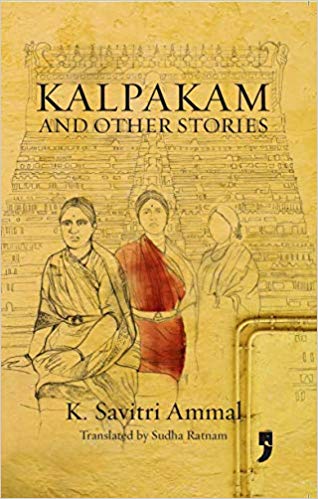Kalpakam and Other Stories is an anthology of stories about women like K Savitri Ammal who, in the early part of the twentieth century, grew up in upper-caste households. The book, first published in Tamil in 1958 and translated into English by Sudha Ratnam in 2019, deals with textures of the priviledged, albeit cloistered, lives of these women, which simmer with hope and talent, and were haunted at the same time by disappointements and a lack of opportunities. Some of the women in these stories, unable to bear the situation, decide to end their lives, and some choose to fight and overcome some of the injustices foisted upon them.
The following is an extract from “Kalpakam” chapter of the book.

Soon after this interlude, Kalpakam did not go to bed immediately. Instead, she quietly went to Masilamani’s room. Masilamani too, unable to sleep, was restlessly pacing up down in his room.
Kalpakam stood at the door. She did not appear as helpless as before. He noticed instead a look of determination and courage in her eyes. Masilamani was slightly afraid to see her thus.
Kalpakam looked at him directly and said with some deliberation, ‘So everything is over between us, isn’t it?’
‘Yes, and is it not for our mutual good that it is so?’ ‘So this is the end of the promises that we made to each other?’
‘Kalpakam, did you hear what my mother said?’
‘Oh, I have not come here to plead with you to love me. Here is the golden chain that you fastened on my neck, considering me your future wife. Why should I keep it with me any longer? I feel it is choking me. Here, take it.’ So saying she unfastened the chain and left it in front of him.
‘Kalpakam, why are you so angry?’
‘No, I am not angry at all. Why should I show my anger to you? I take your leave. There is nothing more that I want to say to you. I think it was a folly to have fallen in love with you. I should have conducted myself like any other maidservant. Alas! What is to be done now?’ Masilamani remained silent and Kalpakam slowly walked back to her room.
[…]
Pillai could hardly figure out how the girl had consented to this marriage. He believed that she being an obedient girl would in due course adjust herself to leading a married life with him. An auspicious date for the wedding was fixed. Thayarammal said with satisfaction, ‘all good events must take place without delay.’
Kalpakam remained stoically silent and left everything to Thayarammal. She firmly refused to be part of any decision-making regarding the marriage. She appeared heartbroken and many of Thayarammal’s friends and relatives thought she was being ungrateful to the elderly lady after having been in her care for so many years. Thayarammal on the other hand, had little to complain about as things were going along as she wished.
[…]
Thayarammal was moved to see Kalpakam in that condition and her eyes filled with tears. ‘Alas, what have I done? I have made a mistake. Why did I interfere in her life thus? How can I undo the marriage now?’ Slowly, her lament grew louder. After sunset, Thayarammal became even more worried and walked restlessly about the house. A few amongthe guests who had come to witness the ceremony realised that something was terribly amiss and whispered to each other in undertones.
‘Maybe the bride is unwell!’ said one.
Another countered by saying, ‘No no, she was not keen on this marriage, that’s the reason.’
‘The groom is much too old for her’ said someone, each voicing a different opinion. Thayarammal came and whispered something in Masilamni’s and Pillai’s ears.




